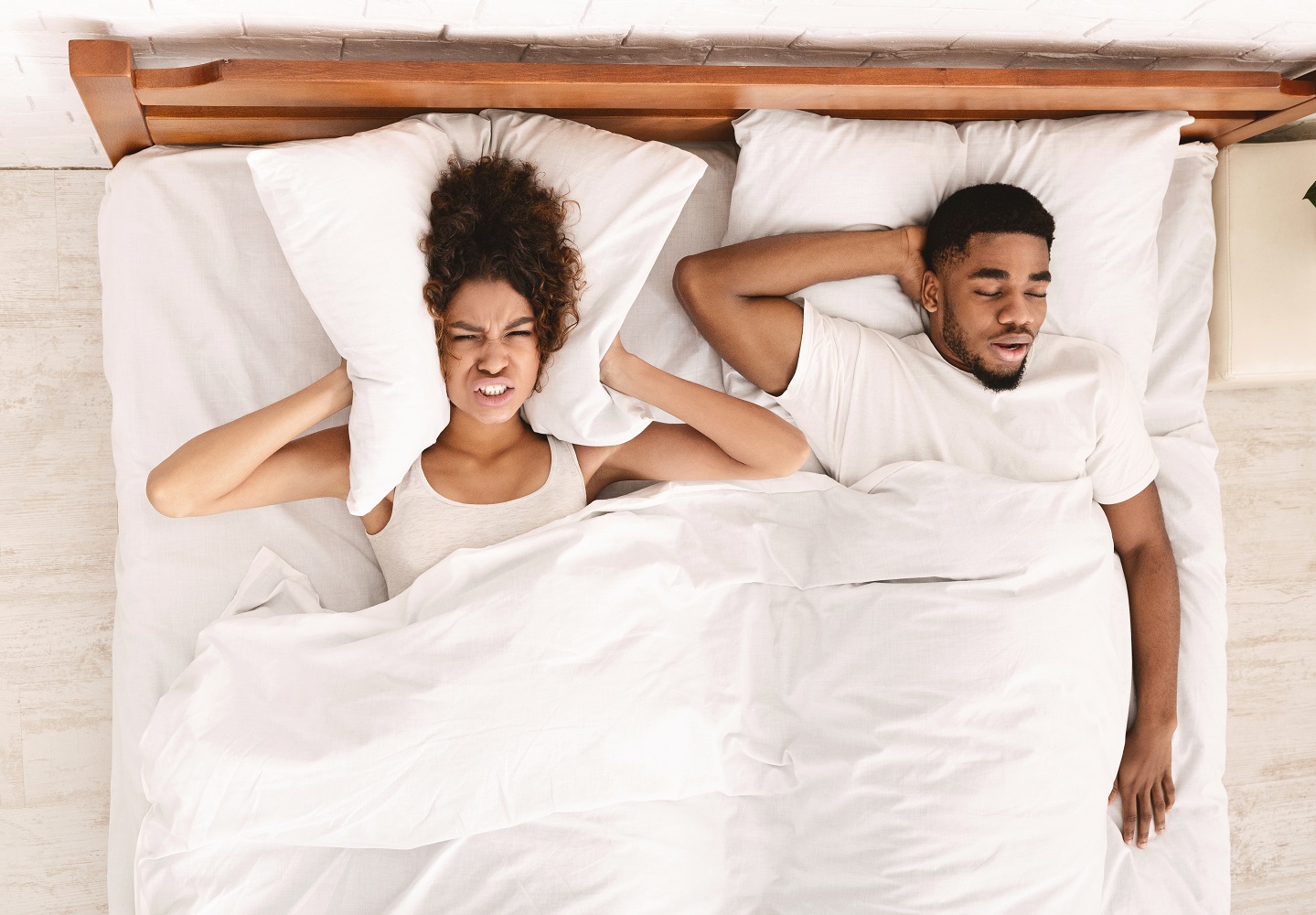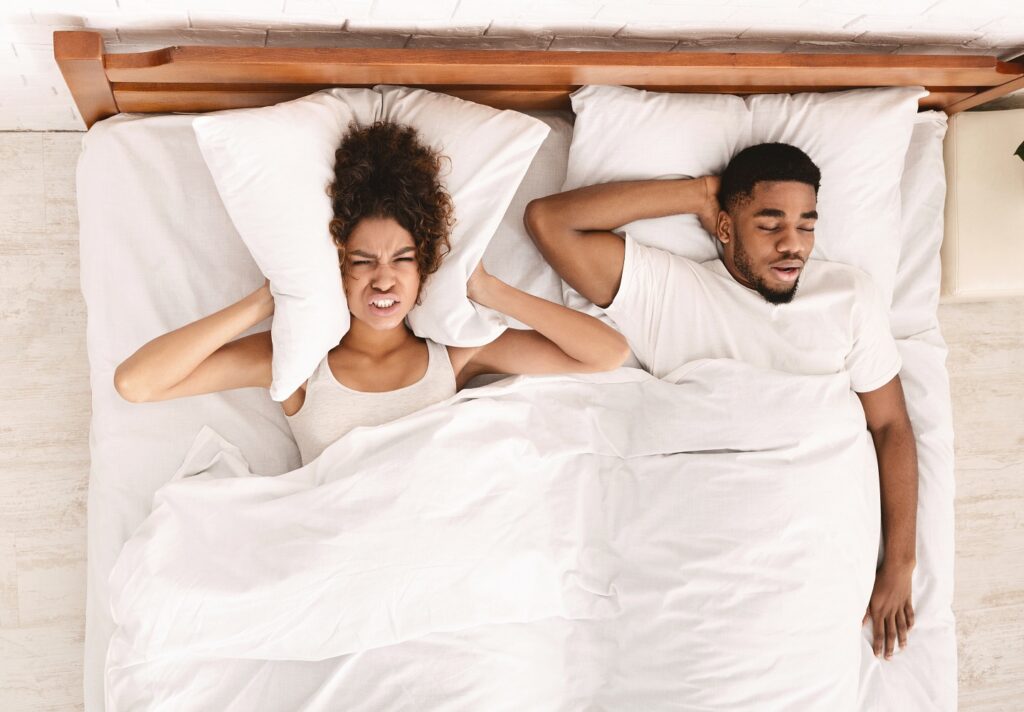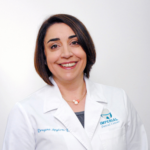
20 May How Your Dentist Can Help Detect Sleep Apnea
 From a gentle flutter to a roof-lifting rumble, snoring can cause sleepless nights for you and your partner. More than just an annoyance, snoring may be caused by the sleep disorder Obstructive Sleep Apnea. About 90 million Americans suffer from snoring, and as many as 50% of those have sleep apnea. Both snoring and sleep apnea can lead to more serious health issues and should not be ignored. Fortunately, there are ways your dentist can help.
From a gentle flutter to a roof-lifting rumble, snoring can cause sleepless nights for you and your partner. More than just an annoyance, snoring may be caused by the sleep disorder Obstructive Sleep Apnea. About 90 million Americans suffer from snoring, and as many as 50% of those have sleep apnea. Both snoring and sleep apnea can lead to more serious health issues and should not be ignored. Fortunately, there are ways your dentist can help.
Facts About Snoring
Snoring occurs when airways are restricted by the collapse of the soft palate tissues in the back of the throat. As the collapse occurs, the air you breathe through your nose and mouth is forced through a narrowed passageway causing a vibration noise. Snoring may also be caused by:
- Narrowed nasal cavity from colds, sinus infection, or a deviated septum
- Enlarged tonsils or adenoids
- Lack of muscle tone in the tongue, soft tissue, and throat
- Taking sleeping pills, tranquilizers, or drinking alcohol before bed
- Family history
- Excessive weight
While snoring may be nothing more than an irritation to the persons around you, sleep apnea is a more serious condition that requires medical assistance.
Facts About Sleep Apnea
In sleep apnea, airways are blocked and breathing actually stops between snores. This interruption can happen dozens and even hundreds of times during the night. As breathing stalls, the diaphragm and chest muscles will naturally try to force air which can cause night gasping or choking. Other indications include:
- Insomnia and difficulty staying asleep
- Feeling less rested after awakening
- Morning headache and memory loss
- Irritated throat and dry mouth
- Excessive fatigue and lack of focus during the day
Left untreated, sleep apnea can contribute to cardiovascular disease due to the loss of blood flow to the heart. Sleep apnea can also increase the risk for Type 2 diabetes due to insulin resistance, cause mood swings, depression, high blood pressure, and stroke.
Oftentimes, a sleeping partner will notice snoring or a pause in breathing before you do. Rule out sleep apnea by scheduling an appointment with your dentist.
How A Dentist Can Help with Snoring and Sleep Apnea
Dentists can help you detect the possibility of having sleep apnea. Their first goal is to gather as much information as possible. Sharing a list of eating and drinking habits, along with any health issues you have been experiencing will help in their assessment. A family history of snoring or sleep apnea is important to share as well.
After a detailed discussion, the dentist will examine your mouth, teeth, and throat. Teeth showing wearing and unevenness can be a sign of grinding, a natural reflex by the brain to open airways. X-rays help identify potential blockage due to enlarged tissues or growths in the throat. Upon completion, your dentist may refer you to a sleep medicine specialist to establish a definitive diagnosis and propose treatment. Depending on the severity of sleep apnea, some treatments that may involve your dentist include, but are not limited to:
Mandibular Advancement Device (MAD)
Mandibular advancement devices are custom-fitted mouthpieces that look similar to a mouthguard. Worn at night, the device brings the lower jaw forward to prevent soft tissues from obstructing the airway. A tongue-retaining device holds the tongue in place to prevent potential blockage of the throat.
The American Sleep Association (ASA) recommends patients wear a mouthguard in general for improved sleeping. Custom guards can also prevent teeth grinding and Bruxism.
Continuous Positive Airway Pressure (CPAP) Machine
A CPAP is a prescribed machine that delivers a constant and gentle pressure of oxygen to cushion the upper airways. This cushion prevents soft tissue from shifting and blocking the throat. The oxygen is delivered through a hose connected to a fitted mask that is placed over the nose or face as determined by your doctor. The tube is long enough to move in your sleep with head straps to keep the CPAP in place.
Most patients report that the biggest adjustment is getting comfortable wearing the CPAP. Over time, the soft hum of the machine becomes more soothing than irritating. More importantly, patients report feeling well-rested with fewer sleep interruptions, no snoring, improved daytime focus, and emotional stability.
At Imperial Dental Center, we want to help you improve the quality and duration of your sleep for a more wakeful day. Contact us today at (281) 265-3567 or schedule an online appointment to discuss snoring or sleeping concerns you may have.

Dr. Dragana Angelova
Imperial Dental Center

